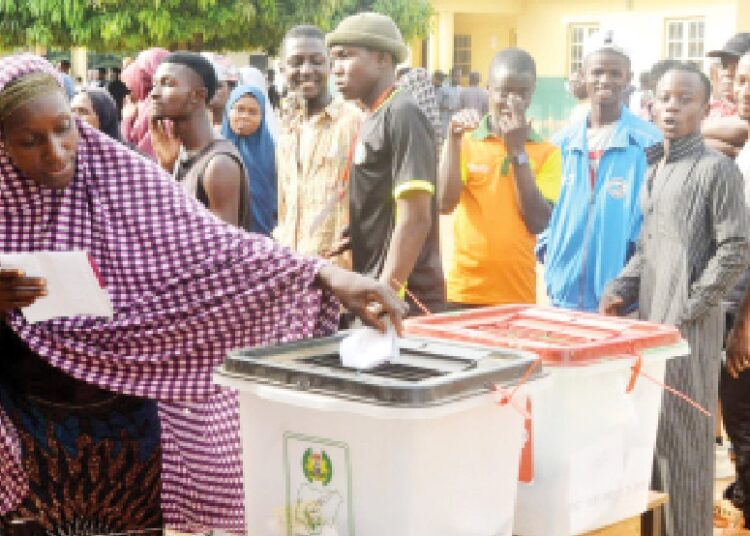The backlash against Nigeria’s last general election, allegedly marked by perceptibly unacceptable outcomes, underscores the need for electoral reforms. As the 2027 election approaches, the urgency of amending the Electoral Act and updating constitutional provisions cannot be overemphasised. This is necessary to ensure the credibility of the process.
Consequently, the nation’s elections management body, the Independent National Electoral Commission (INEC) has raised 142 reform proposals for consideration and enactment by the National Assembly.
The proposals are designed to ensure that elections reflect the will of the people, reduce political manipulation, and expand voter access. Yet, despite the clarity and urgency of the needed reforms, these proposals remain stalled in the National Assembly. With barely two years before the next general election, there is an alarming risk that the reforms may not be passed in time for implementation, threatening the credibility of the entire process.
The Commission’s proposed reforms are substantial but necessary. They include legalising early voting, enabling diaspora voting, establishing an Electoral Offences Commission, and creating a Political Party Regulatory Agency. These changes are envisaged to expand voter access, reduce the possibility of political and vote manipulation, and create a more transparent electoral environment. Furthermore, two of the most crucial aspects of these reforms are the introduction of alternative identification methods for voters, which would help alleviate the persistent problems associated with the distribution of the Permanent Voter’s Card (PVC) and the one ensuring the electronic transmission of polling results to remove it from manipulation.
Such provisions, it is hoped, would open up the electoral process, especially to historically excluded groups, such as people with disabilities, essential workers, and Nigerians living abroad.
However, these reforms will be meaningless if the National Assembly fails to act swiftly. The legislative process is already running behind schedule, and delays in passing these proposals and empowering them and assenting to them will limit INEC’s ability to plan effectively for the election.
Electoral preparation is a lengthy process that requires clarity in legal frameworks long before polling day. Without these reforms, INEC’s ability to procure materials, train staff, and run public awareness campaigns will be severely hampered. Furthermore, the proposed reforms are not just administrative changes—they are fundamental to ensuring that elections are free, fair, and credible. Any further delays will only fuel public frustration and potentially undermine the legitimacy of the entire electoral process.
The failure to act may raise concerns given the not-too-palatable lessons from the 2023 elections. Issues with the Bimodal Voter Accreditation System (BVAS), delayed result uploads, and a technical glitch in uploading presidential results damaged public confidence in the system. These problems, in our view, must not be allowed to recur in 2027. With the introduction of new technologies and voting provisions, the risks of failure only increase without the legal certainty that these reforms would provide.
Moreover, the over-centralisation of INEC’s duties has placed undue strain on the Commission. Creating an Electoral Offences Commission and a Political Party Regulatory Agency would allow INEC to focus on its core duties while ensuring that electoral offences and political party activities are appropriately monitored and regulated. This division of responsibilities is long overdue and would contribute significantly to the integrity of the process. Similarly, proposals aimed at guaranteeing INEC’s operational and financial independence, particularly reforms related to the leadership appointment process, would ensure that the Commission remains insulated from political influence. .
The delays in the legislative process, whether deliberate or due to inefficiency, only serve to preserve loopholes that allow for political exploitation. The failure to pass the necessary reforms would not just be an administrative oversight—it would be a betrayal of the democratic aspirations of millions of Nigerians. As civil society organisations, political analysts, and the general public have pointed out, these delays are not a trivial matter; they pose a direct threat to the credibility of Nigeria’s electoral system and, by extension, to its democracy.
We are persuaded that these proposals are relevant to the credibility of the electoral process. Therefore, we urge the National Assembly to expedite action on them, readjust its lawmaking duties, and prioritise the legislation of these electoral reforms. Lawmakers have long discussed the need for a more transparent and accessible electoral system, and now is the time to deliver.
Failure to act would suggest that politicians are more interested in preserving—and benefiting from—the status quo than in strengthening the country’s electoral system. This would not only be a missed opportunity but also send a dangerous message about the political class’s unwillingness to change and modernise Nigeria’s democracy.
As a newspaper, we warn that delaying these reforms to 2026 would be a tragic replay of past mistakes. The National Assembly must prioritise electoral reform above politics. It is in the county’s best interest.





